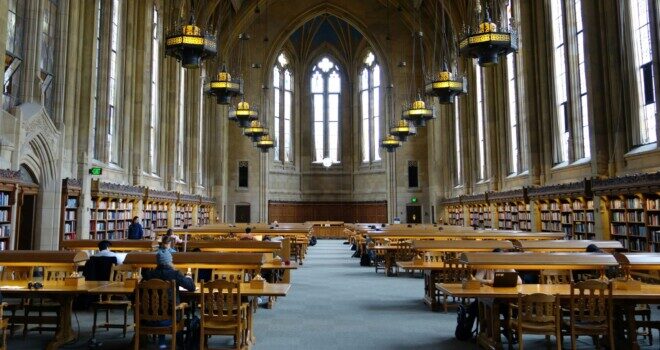As summer nears its end, many households enter the back-to-school season. Perhaps the most jarring of these is the departure of a child for their first year of college. Departing for college often comes with lengthy book lists, school and dorm room supplies, student loans, emotional good-byes, and younger siblings determining what to do with the newly vacant room.
With thousands of universities within the United States, we have become used to the existence of such institutions; they have become a common element within American society. I suggest taking a few minutes pause from the back-to-school tasks to rediscover how this common element in our society and around the globe comes from the Catholic Church.
One of the great lies that persists in our day is the generalization that the middle ages were anti-reason, superstitious, and the time of darkness awaiting the supposed enlightenment. One cannot study these centuries and their intellectual and creative works and hold that to be true.
One negation of the lie is the birth of the university system. It grew from within and with the support of the Church, not in spite of the Church, sometime around the 12th century. The medieval Christians had a strong desire for knowledge and a desire to integrate knowledge systematically. Already, and partly due to the missionary character of the Church, educational entities were in places that centered around cathedrals and monasteries. Newer institutions then grew from such schools, and they began offering what became known as degrees.
Today we are used to accreditation as the mechanism that legitimizes degrees, but one of the initial central figures in this process, as a sort of original accreditor, was the Catholic Church. The earliest universities include Bologna, Paris, Oxford, Cambridge, and others that soon followed, like La Spienza in Rome. Bologna’s university charter was given by Pope Clement III in 1189, and the University of Paris received its charter from Pope Innocent III in 1215. Degrees from such universities were then recognized throughout what was called Christendom, not just the individual kingdom or city. The founders of the first universities were Catholics, and the popes played a crucial role in supporting them.
It was the popes of these centuries that often intervened in disputes and protected the universities, like with giving students the legal protection of the benefit of clergy. Pope Honorius III sided with the university scholars in Bologna in a debate in the thirteenth century. Pope Innocent III intervened against the overreach of the chancellor in Paris. It was Pope Gregory IX in the 1231 papal bull Parens Scientiarum that protected the institutional autonomy from outside influence in its pursuits of truth.
The pursuit of truth in these universities was understood within a Catholic context, and as such participated in the mission of the Church. The last point that might surprise the reader is the intervention of popes to advocate for better wages for professors. Some, myself included, do not believe the university could have developed and survived past infancy without the Church.
The essential magisterial document governing all Catholic Universities today was promulgated by another pope, Saint John Paul II. It is entitled Ex Corde Ecclesiae. Church Documents often receive their name from the opening words of the text, much like the title “Our Father” and “Hail Mary” for specific prayers. This opening line is translated as, Born from the heart of the Church. What a wonderful encapsulation of the above historical points! The opening line from this papal defender of the university reads, “Born from the heart of the Church, a Catholic University is located in that course of tradition which may be traced back to the very origin of the University as an institution” (ECE, 1). To help parents and students locate those universities which best exemplify the Church’s vision for a university, there are resources and organizations available such as the Cardinal Newman Society’s Newman Guide.
Perhaps when helping your student pack for college and giving the talk about the importance of continuing to pray and go to Mass, find a way to introduce to them the fact that universities exist because of the Catholic Church and that in the earliest centuries, it was the pope who acted as the Father-Protector.
While many universities no longer enjoy closeness with the Church, it will continue to be the Church that promotes the authentic vision of a university in the world today. A universal Church protecting and promoting the idea of a university.
Photo by Ken Theimer on Unsplash










